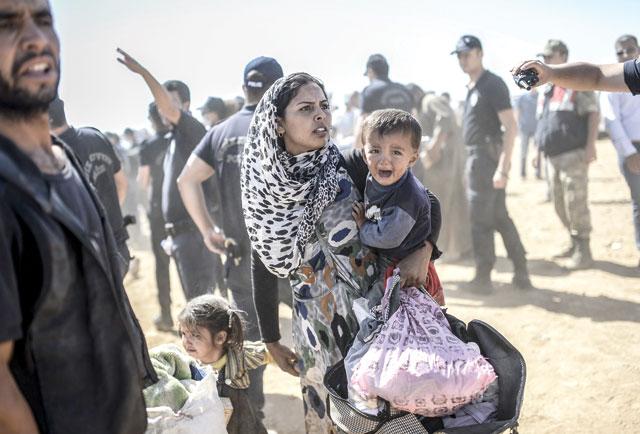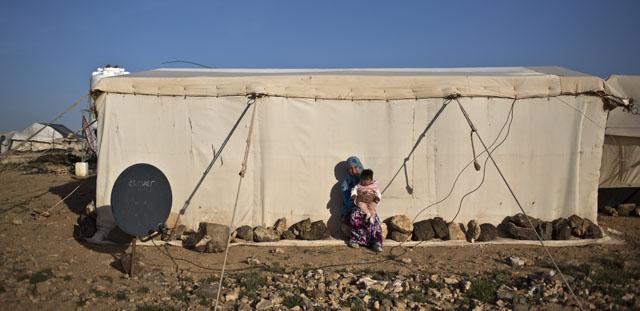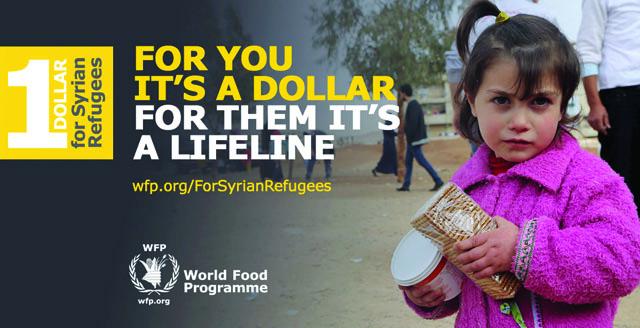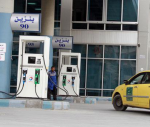You are here
Food assistance suspension shocks already vulnerable Syrian families
By Johannes Decat - Dec 08,2014 - Last updated at Dec 08,2014
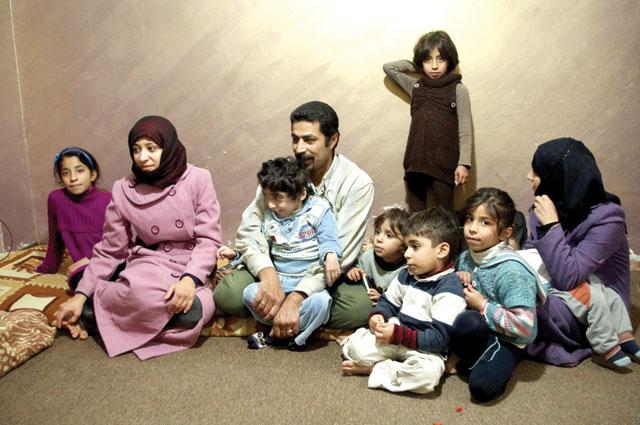
AMMAN — Ali Marhabji, his wife and eight children are one of the thousands of Syrian families affected by last week’s decision by the World Food Programme (WFP) to suspend a critical food voucher scheme, citing lack of funding.
The Marhabjis have joined around 1.7 million Syrian refugees in the Middle East affected by the development. In Jordan, 440,000 of the total registered Syrian refugee population of around 600,000 will be food insufficient, according to WFP.
The family fled to Jordan after their son Hassan was critically wounded by shrapnel in their war-torn hometown of Aleppo, Syria. They now live in a small apartment in Dahiyat Al Amir Hassan in northeast Amman.
A wooden door keeps the stench of cat faeces from the staircase out of the apartment, where the family tries to make the best use of their resources. The floor of their living room is coated with carpets to keep warm in winter and a broken window is boarded up with a wooden plate. The father is an all-rounder, a valuable skill for many Syrian refugees, who must use their creativity to improve their standards of living.
Informal work
“In Syria I worked as a taxi driver,” Marhabji told The Jordan Times at his home. “Here in Jordan I do all kinds of jobs: laying tiles, electricity, water, cleaning carpets.” Working is illegal for Syrian refugees without a work permit, but in critical situations as these, the law is not strictly enforced, although he has had some trouble with police on the backdrop of his legal status.
The family has also found other ways to generate income; the father and his children collect empty Pepsi cans and plastic bottles to sell for recycling. For example, 100 cans earn the family JD2.
If he had the money, he would go back to Syria. “Without the food coupons, without adequate assistance, I would rather just go there and even die there, instead of living here,” the father said.
Education
The lack of income also affects the education of Marhabji’s children. Before the suspension of the food vouchers, the family was already struggling to uphold the children’s right to education. “The vouchers used to assist. They were not everything, but at least something.”
Of the eight children in the family, only three go to school. Rama, their 14-year-old daughter, dropped out of school because the family did not have the money to pay for the bus. They already spent JD45 for the youngest children’s transportation to school, but Rama, being older, had to go to another school. This would have cost the family JD50 per month for transportation, an amount the family cannot afford.
Now Ali Marhabji has found a job for Rama at a nursery. The girl understands that there is no other option but to work. In a world without crisis, however, she would have become an Arabic teacher. She used to excel in Arabic at school, she proudly said.
Mloukhiya without chicken
The suspension of the food assistance came as a shocking news to many Syrian refugees. “It really broke me,” Ahmad Hassan — a father of 10 from Aleppo currently living in the Nuzha suburb in north Amman — told The Jordan Times. Every month, his family used to have an income of JD600 to 700, of which around 200 came from WFP vouchers. Without the vouchers, he will not be able to buy the same food they used to have on the table. “If my kids need milk, I will be able to afford it once, but not 10 times,” he said. Food is of great traditional importance to many Syrians, but this family has to eat their Mloukhiya (or Jews mallow, a traditional East Mediterranean dish, normally with chicken or lamb) without meat.
The family hence rejoiced when one of their Jordanian neighbours, whom they do not even know that well, offered the household breakfast, lunch and dinner upon hearing about the suspension of the WFP food assistance. In times of hardship, humanitarian gestures often are the only solace.
Related Articles
The United Nations World Food Programme (WFP) on Monday announced that it has been forced to suspend a critical programme providing vouchers to more than 1.7 million Syrian refugees in neighbouring countries including Jordan.
The UN World Food Programme (WFP) has announced that its food assistance for Syrian refugees living in Jordanian communities will be prioritised further to make sure support goes to those most in need.
After being forced to suspend food assistance to nearly 1.7 million Syrian refugees earlier this week, the United Nations World Food Programme (WFP) on Wednesday launched an “ambitious” 72-hour campaign to raise $64 million which will reinstate refugee food vouchers in December.


